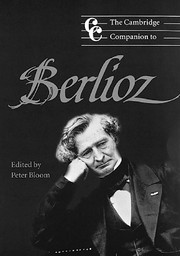Book contents
- Frontmatter
- Introduction: Berlioz on the eve of the bicentenary
- Part I Perspectives
- Part II Principal compositions
- 3 Genre in Berlioz
- 4 The symphonies
- 5 The concert overtures
- 6 The operas and the dramatic legend
- 7 The religious works
- 8 The songs
- Part III Major writings
- Part IV Execution
- Part V Critical encounters
- Part VI Renown
- Notes
- Bibliography
- Index
5 - The concert overtures
from Part II - Principal compositions
Published online by Cambridge University Press: 28 September 2011
- Frontmatter
- Introduction: Berlioz on the eve of the bicentenary
- Part I Perspectives
- Part II Principal compositions
- 3 Genre in Berlioz
- 4 The symphonies
- 5 The concert overtures
- 6 The operas and the dramatic legend
- 7 The religious works
- 8 The songs
- Part III Major writings
- Part IV Execution
- Part V Critical encounters
- Part VI Renown
- Notes
- Bibliography
- Index
Summary
Like his symphonies, Berlioz's concert overtures raise lingering questions regarding the effect of “story” or program upon pure musical coherence. Their relative brevity – crucial to their popularity both during and after the composer's lifetime – allows observation of how he handled such matters as organization and orchestration in the approximately twenty-five-year period between the composition of the first and last works included in this category.
The genre of the concert overture excludes those composed as operatic preludes. For this reason there is no discussion here of the Grande Ouverture de Benvenuto Cellini, composed in February 1838 and published in full score in 1839, long before the rest of the opera, or of the overture to Béatrice et Bénédict. Les Troyens is striking for – among other things – its opening in medias res, with no separate overture. However, when external considerations caused Les Troyens to be divided in half, Berlioz felt the necessity of explicating the action of La Prise de Troie (the acts excised at the time of the performance) by opening Les Troyens à Carthage with a Prologue, which he composed in June 1863. This consists of a Lamento, a Légende (in which a rapsode, or epic narrator, gives a synopsis of La Prise de Troie), and the Marche troyenne “in the triumphal mode” accompanied by a Choeur de rapsodes.
- Type
- Chapter
- Information
- The Cambridge Companion to Berlioz , pp. 69 - 80Publisher: Cambridge University PressPrint publication year: 2000



